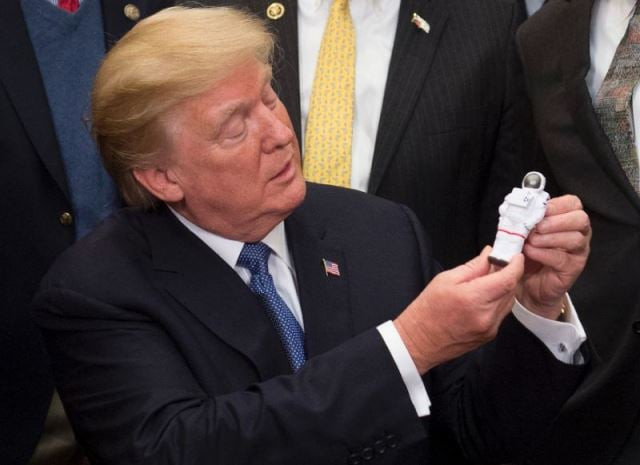Trump tells NASA to send Americans to Moon
The last time US astronauts visited the Moon was during the Apollo missions of the 1960s and 1970s

President Donald Trump signed a directive to send Americans back to the Moon in the presence of Harrison Schmitt, one of the last Americans to walk on Earth's satellite 45 years ago. PHOTO: AFP
"This time we will not only plant our flag and leave our footprint," Trump said at a White House ceremony as he signed the new space policy directive.
"We will establish a foundation for an eventual mission to Mars and perhaps someday to many worlds beyond."
The directive calls on NASA to ramp up its efforts to send people to deep space, a policy that unites politicians on both sides of the aisle in the United States.
However, it steered clear of the most divisive and thorny issues in space exploration: budgets and timelines.
World not coming to an end today, assures NASA
Space policy experts agree that any attempt to send people to Mars, which lies an average of 140 million miles (225 million kilometers) from Earth, would require immense technical prowess and a massive wallet.
The last time US astronauts visited the Moon was during the Apollo missions of the 1960s and 1970s.
On July 20, 1969, US astronaut Neil Armstrong became the first man to walk on the Moon.
Trump, who signed the directive in the presence of Harrison Schmitt, one of the last Americans to walk on the Moon 45 years ago, said "today, we pledge that he will not be the last."
The better known Buzz Aldrin, the second man on the Moon after Armstrong and a fervent advocate of future space missions, was also present at the ceremony but not mentioned by Trump during his speech.
Trump and Vice President Mike Pence, who heads the newly revitalized National Space Council, have previously vowed to explore the Moon again, but offered few details.
NASA spacecraft to end its journey by plunging into Saturn
Nevertheless, the announcement was welcomed by NASA's Acting Administrator Robert Lightfoot, who said the agency "looks forward to supporting the president's directive" and "strategically aligning our work to return humans to the Moon, travel to Mars and opening the deeper solar system beyond."
Former US president George W. Bush also pledged to send Americans to the Moon as part of the Constellation program, which ran from 2005 to 2009.
Constellation was projected to cost $100 billion, and aimed to get boots on the Moon's surface by the late 2020s.
In 2009, then president Barack Obama deemed it too costly and repetitive of missions already achieved, and canceled the program in order to focus on reaching Mars by the 2030s.
Trump vowed his new directive "will refocus the space program on human exploration and discovery," and "marks an important step in returning American astronauts to the Moon for the first time since 1972."
The goal of the new Moon missions would include "long-term exploration and use" of its surface.
"We're dreaming big," Trump said.
His administration has previously held several meetings with SpaceX boss Elon Musk and Amazon owner Jeff Bezos, who also owns Blue Origin.
A White House statement acknowledged that partnerships with other nations and private industry could well be on the cards.
The US "will work with other nations and private industry to return astronauts to the Moon, developing the technology and means for manned exploration of Mars and other destinations in our solar system," it said.




1725099588-0/BeFunky-(41)1725099588-0-208x130.webp)














COMMENTS
Comments are moderated and generally will be posted if they are on-topic and not abusive.
For more information, please see our Comments FAQ